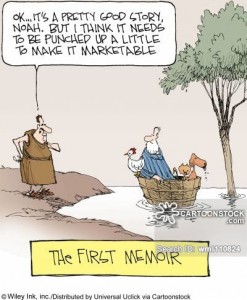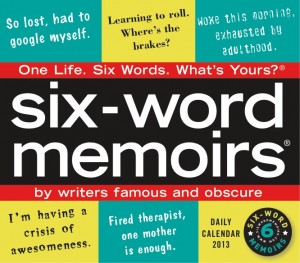I found that writing my memoir during National Novel Writing Month was surprisingly similar to my experience of writing novel first drafts. Even though I knew what would happen in my life, there was still the anxiety of wondering whether or not it would work as a story. I also didn’t know exactly which incidents would make it into the memoir. And for many that did, my feelings about them or their meaning for me changed in the process of writing about them. I should have expected this and should also have found it exciting, since exploration is part of the fun of writing, but exploring so close to home was uncomfortable.
This, for me, was a difference between writing fiction and memoir. Even when my fictional characters undergo worse things than I did, I’m only sharing their experience vicarously. Re-living the worst year of my life wasn’t fun, which made NaNoWriMo useful as a device to propel me through the draft and for providing a short term deadline — I knew I’d be done with it in a few weeks.

The obvious difference between memoir and fiction is that memoir is true, while fiction is made up. These had pluses and minuses for the two genres.
Since I don’t write novels from an outline, the memoir facts felt like a safety net. I didn’t have to tax my brain to come up with the next event and be concerned about events being believable. The memoir includes coincidences that novel readers might question and doesn’t fully show why certain unexplanable things happened. If the reader trusts me as a writer, he or she will have to accept the memoir events as as true.
The downside of memoir, of course, is that I can’t make it up. This is where I ran into the biggest problem with the book. The first part went fine and progressed to a mid-point climax, after which the story’s narrative drive plummetted as my real life moved less grippingly. I don’t know how to fix this. One solution would be to make it a much shorter story, ending with that first climax followed by brief denoument. But that isn’t the whole story. It’s only true as far as it goes and would leave out a lot of what I want to say. The alternate approach is to insert drive to the second part to maintain reader interest. In a novel, this is no problem – my imagination is the limit. I could have a flood strike (believably) and in the course of my further struggles I’ll learn part 2 of my life lesson.
Another limiting factor for memoir is concern about hurting other people. While I anticipated this being an issue for the larger memoir events, I found it also applied to some less significant ones. The problem is that altering or omitting facts to protect others can harm the story’s truth, reduce its narrative impact, and lose readers’ trust if they feel you’re keeping things from them.
Both novels and memoir deal with theme; what the story means, its main message, what it’s striving to say. While theme is important to a novel, from my brief experience, I would say that theme matters more in a memoir since it’s really what the story is about. Unless you’re famous or your prose is outstanding, what the memoir says that’s a new or different will be what makes it sell. In a novel, the message has been said before. Freshness comes from the colour — characters, plot, original settings.

An advantage I appreciate for memoirs is that they tend to be shorter than novels. This was certainly so for me. With my novel drafts, it’s been an effort to get them down to 100,000 words. My memoir draft came in at 31, 327 words. Reasons for this included such things as (1) the memoir is only about me. In a novel, I’d be exploring other characters, perhaps with alternating points of view, or throw in a murder I would have to solve and, in the process, come to terms with my problem (which might work better than a flood to give my memoir’s second half a narrative drive). (2) Shorter scenes also contributed to my memoir’s brevity. In a novel, I can easily imagine long dialogue exchanges between my characters. My memories contain, at most, a few lines of what people said.
Both genres have their challenges. I still prefer writing fiction, but feel a tug to make this memoir work. I’m reading more memoirs and looking at them with writerly interest to see how they’re put together and might show me a way out of the problems with my NaNoWriMo first draft.